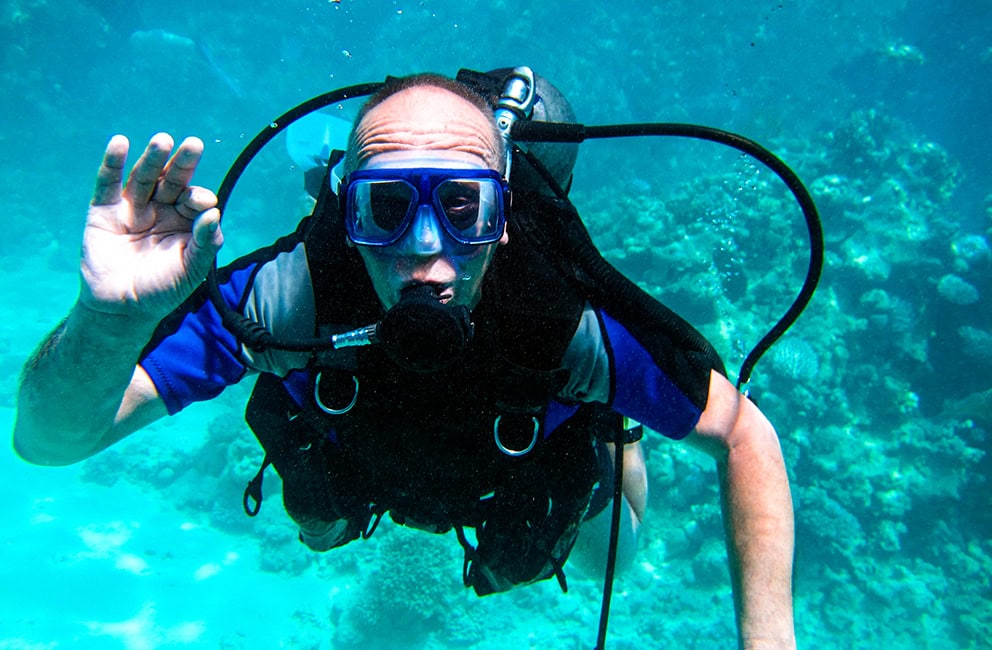
Whether you’re short-sighted, long-sighted or suffer from astigmatism, you can still immerse yourself in the beauty of the marine world in perfect clarity.
Join us as we discuss the pitfalls of wearing contact lenses and the benefits of kitting yourself out with a fully custom-made prescription lens mask. Oh, and we’ll also tell you why you shouldn’t even consider wearing glasses underneath your scuba mask.
It’s not recommended that you scuba dive while wearing glasses for a multitude of reasons, including:
If you do wear glasses, there’s no need to despair, you’ll still be able to dive. Let’s look at the other options available to you.
Scuba diving with contact lenses is a safer alternative to scuba diving with glasses on. However, there are risks involved, especially if you have the wrong type of lenses on. Here are how the two types of contact lenses differ when scuba diving:
It is recommended that you steer clear of hard contact lenses for scuba diving. Hard lenses don’t allow gases to penetrate, which can result in gas bubbles forming between the lens and the cornea, blurring vision during your dives. There’s also the risk of the lenses drying out while you’re underwater, due to the changes in pressure at greater depths.
On top of that, hard contact lenses leave you vulnerable if your mask were to flood. As they are smaller, they are more likely to fall out of your eyes than their softer alternatives.
Soft contact lenses are not gas-permeable, so you won’t face the issue of blurred vision due to a build-up of gas bubbles behind the lenses. They also allow nitrogen to escape, which reduces the risk of experiencing symptoms of motion sickness while underwater.
Perhaps most importantly, softer contact lenses are more comfortable when underwater, as they don’t allow oxygen in, which reduces irritation.
While soft contact lenses are the best option of the two, they are still vulnerable to issues, especially when exposed to water.
Pros:
Cons:
While scuba diving with soft contact lenses is a viable option, it pales in comparison to diving with a prescription scuba mask. Wearing a prescription scuba mask takes away any potential complications that could arise when wearing contact lenses underwater, allowing you to absorb your surroundings in perfect clarity.
Getting your own bespoke prescription mask is relatively simple, but it does leave you with a decision to make over which type you opt for. Here are the options available to you:
Getting a custom-made prescription diving mask is more of an investment, as the mask will be made to your exact specifications. However, this will ensure that your mask is tailored to your eyesight, making for perfect vision when you’re underwater.
Unlike custom-made options, ready-made prescription masks are made for standard prescriptions, making them less accurate for their user. However, this does mean that they are considerably more affordable, while still improving your underwater vision.
If you don’t want to fork out the amount of cash required to buy a custom-made mask, drop-in lens masks may be your best option. They feature removable lenses that can be replaced with prescription lenses, which is ideal for longevity, as eyesight changes over time.
Just like normal glasses, there are two main types of lenses for prescription scuba masks. These are:
Pros:
Cons:
Poor vision doesn’t have to get in the way of an unforgettable scuba diving adventure. At Dive Sight, we’re proud to provide prescription-lens scuba masks that ensure you’ll experience the surrealism of the marine world in perfect clarity.
We have a wide range of products to suit all face shapes and sizes, and all age ranges, to ensure everyone can experience the joy of diving. Contact us today to find out how we can help you.